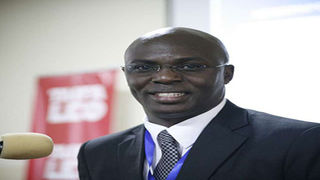
The late Ken Walibora.
| File | Nation Media GroupWeekend
Premium
Translation giving minor literatures a global voice
What you need to know:
- Mzee Abdilatif Abdalla’s book, Sauti ya Dhiki (Oxford,1973 ) translated as Voice of Agony by the late Kiswahili novelist, Ken Walibora.
- England based scholar, Prof Chege Githiora, has translated the historical Kiswahili novel, Kaburi Bila Msalaba (Phoenix, 1969) by Peter Munuhe Kareithi under the title Unmarked Grave (Phoenix, 2017).
Literary translation has for a long time played a significant role in the development of Kiswahili literature. The European formal education system, for example, which was ‘introduced’ in East Africa by Christian Missionaries and the colonial governments, enhanced the translation of very many works.
Fredrick Johnson of the Inter-territorial Language (Swahili) Committee (ITLC) was the first person to do major literary translations of such books as Louis Stevenson’s Treasure Island in 1928 – under the title, Kisiwa Chenye Hazina. He was aided by Mr E.W. Brenn.
The ITLC (later, The East African Swahili Committee) – which served Kenya, Uganda, Tanganyika and Zanzibar from its inception in 1930 to 1964 greatly influenced the language policy in the region and the publishing landscape.
In his article, ‘Africa and Global Culture’ (Sunday Nation, April 22, 1979) – the late global scholar, Prof Ali Mazrui contemplates the question of whether or not the West must dominate the world order and culture. He says, “It would be staggering if a British Prime Minister were even to be interested in translating into English the much shorter Swahili poetic work Utenzi wa Mwanakupona.”
Prof Mazrui was referring to Julius Nyerere’s translations of Shakespeare’s Julius Caesar and The Merchant of Venice into Kiswahili under the titles Juliasi Kaizari (Oxford University Press, 1969) and Mabepari wa Venisi (Oxford University Press, 1969).

Tanzania's first president the late Mwalimu Julius Nyerere.
Yet, Mazrui puts a rider in his argument that Nyerere did not translate Shakespeare’s works into Kiswahili because he loved the writer, or the English culture and language – but wanted to show that an African language (such as Kiswahili) was capable of explaining and transmitting knowledge from other cultures, and world civilizations.
Translating Kiswahili works
Although the translation of English literary works to Kiswahili has dominated the scene for a long time, the trajectory is slowly changing – at least going by the intentional efforts being done by some individuals who are translating Kiswahili works into English.
Examples of such works include renowned poet and political activist – Mzee Abdilatif Abdalla’s book, Sauti ya Dhiki (Oxford,1973 ) translated as Voice of Agony by the late Kiswahili novelist, Ken Walibora, Ebrahim Hussein’s historical play Kinjeketile (OUP,1969), translated by the author under the same title and published by Oxford University Press.
Kenyan scholar and cultural crusader, Prof Kimani Njogu also translated another play by Ebrahim Hussein, Kwenye Ukingo wa Thim (OUP, 1988) under the title At the Edge of Thim (OUP, 2000). Ebrahim Hussein is arguably one of the most influential Kiswahili playwrights to have emerged in East Africa.
Other Kiswahili works that have been translated into English are Prof Kithaka wa Mberia’s anthology of poems – Mchezo wa Karata and Msimu wa Tisa, both translated under the titles; A Game of Cards and The Ninth Parliament by Prof Zaja Omboga of the University of Nairobi. Prof Omboga has also translated K.W. Wamitila’s novel, Unaitwa Nani under the title – Who are You?
Ken Walibora’s ‘most successful novel’, Siku Njema has also been translated as A Good Day (Longhorn, 2019) by Dorothy Kweyu of Daily Nation and the late Tanzanian author and translator, Fortunatus Kawegere.
Minority literatures
England based scholar, Prof Chege Githiora, has translated the historical Kiswahili novel, Kaburi Bila Msalaba (Phoenix, 1969) by Peter Munuhe Kareithi under the title Unmarked Grave (Phoenix, 2017). This book is a fictional account of real events witnessed by the late P.M.Kareithi during the struggle for Kenya’s independence in the 1950s. The translator, Prof Githiora teaches at the University of London's School of Oriental and African Studies (SOAS).
Also, one of the novels of East African’s most revolutionary Kiswahili writer, Euphrase Kezilahabi, Rosa Mistika, is also being translated into English by Jay Rubin, an American academic and translator. Prof Kezilahabi, who died in 2020, is well known across the globe for his experimental writing. The project is being funded by PEN/Heim Fund Grants, USA.
Prof Zaja Omboga, who is also a renowned translation theorist, sees the reverse in the trend of translating literary works — from the well-established template of English to Kiswahili, to Kiswahili into English as revolutionary.
“The fact that there are so many works – originally written in Kiswahili and now translated or being translated into English is a clear indication that the world is now interested in ‘minority literatures,” He says.
The scholar further argues: “The fact that literary critics from the west are getting interested in Kiswahili literature is in itself a big statement that Africa in general, and East Africa in particular, is contributing to global discourses. The nature of translation itself involves knowledge and the transfer of culture. Therefore, the upsurge of translations of Kiswahili literary works into English in itself ends the discrimination of the so called ‘minor literatures’ because the translated works are read by larger audiences.”
The most interesting development is that, publishers in the west are willing to fund translation projects of works being rendered to English from Kiswahili. A good example is the Two Lines Press in the United States of America which has, for example, accepted to publish this writer’s translation of Clara Momanyi’s Kiswahili novel – Nakuruto (Longhorn, 2019). Such a development is a gain for Kiswahili literature.
Enock Matundura, the translator of Barbara Kimenye’s Moses series (Oxford University Press) teaches Kiswahili literature at Chuka Uviversity. [email protected]




